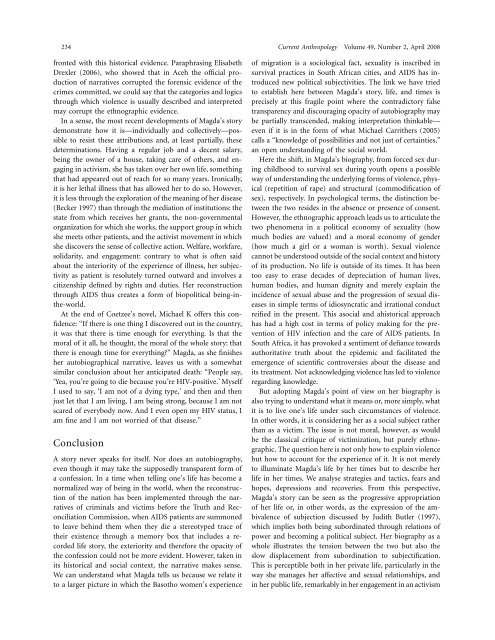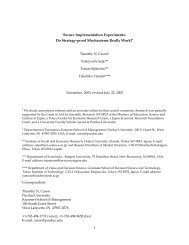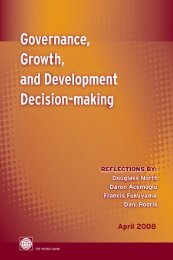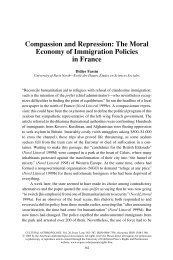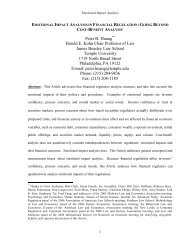Life & Times of Magda A: Telling a Story of Violence in South Africa
Life & Times of Magda A: Telling a Story of Violence in South Africa
Life & Times of Magda A: Telling a Story of Violence in South Africa
Create successful ePaper yourself
Turn your PDF publications into a flip-book with our unique Google optimized e-Paper software.
234 Current Anthropology Volume 49, Number 2, April 2008<br />
fronted with this historical evidence. Paraphras<strong>in</strong>g Elisabeth<br />
Drexler (2006), who showed that <strong>in</strong> Aceh the <strong>of</strong>ficial production<br />
<strong>of</strong> narratives corrupted the forensic evidence <strong>of</strong> the<br />
crimes committed, we could say that the categories and logics<br />
through which violence is usually described and <strong>in</strong>terpreted<br />
may corrupt the ethnographic evidence.<br />
In a sense, the most recent developments <strong>of</strong> <strong>Magda</strong>’s story<br />
demonstrate how it is—<strong>in</strong>dividually and collectively—possible<br />
to resist these attributions and, at least partially, these<br />
determ<strong>in</strong>ations. Hav<strong>in</strong>g a regular job and a decent salary,<br />
be<strong>in</strong>g the owner <strong>of</strong> a house, tak<strong>in</strong>g care <strong>of</strong> others, and engag<strong>in</strong>g<br />
<strong>in</strong> activism, she has taken over her own life, someth<strong>in</strong>g<br />
that had appeared out <strong>of</strong> reach for so many years. Ironically,<br />
it is her lethal illness that has allowed her to do so. However,<br />
it is less through the exploration <strong>of</strong> the mean<strong>in</strong>g <strong>of</strong> her disease<br />
(Becker 1997) than through the mediation <strong>of</strong> <strong>in</strong>stitutions: the<br />
state from which receives her grants, the non-governmental<br />
organization for which she works, the support group <strong>in</strong> which<br />
she meets other patients, and the activist movement <strong>in</strong> which<br />
she discovers the sense <strong>of</strong> collective action. Welfare, workfare,<br />
solidarity, and engagement: contrary to what is <strong>of</strong>ten said<br />
about the <strong>in</strong>teriority <strong>of</strong> the experience <strong>of</strong> illness, her subjectivity<br />
as patient is resolutely turned outward and <strong>in</strong>volves a<br />
citizenship def<strong>in</strong>ed by rights and duties. Her reconstruction<br />
through AIDS thus creates a form <strong>of</strong> biopolitical be<strong>in</strong>g-<strong>in</strong>the-world.<br />
At the end <strong>of</strong> Coetzee’s novel, Michael K <strong>of</strong>fers this confidence:<br />
“If there is one th<strong>in</strong>g I discovered out <strong>in</strong> the country,<br />
it was that there is time enough for everyth<strong>in</strong>g. Is that the<br />
moral <strong>of</strong> it all, he thought, the moral <strong>of</strong> the whole story: that<br />
there is enough time for everyth<strong>in</strong>g?” <strong>Magda</strong>, as she f<strong>in</strong>ishes<br />
her autobiographical narrative, leaves us with a somewhat<br />
similar conclusion about her anticipated death: “People say,<br />
‘Yea, you’re go<strong>in</strong>g to die because you’re HIV-positive.’ Myself<br />
I used to say, ‘I am not <strong>of</strong> a dy<strong>in</strong>g type,’ and then and then<br />
just let that I am liv<strong>in</strong>g, I am be<strong>in</strong>g strong, because I am not<br />
scared <strong>of</strong> everybody now. And I even open my HIV status, I<br />
am f<strong>in</strong>e and I am not worried <strong>of</strong> that disease.”<br />
Conclusion<br />
A story never speaks for itself. Nor does an autobiography,<br />
even though it may take the supposedly transparent form <strong>of</strong><br />
a confession. In a time when tell<strong>in</strong>g one’s life has become a<br />
normalized way <strong>of</strong> be<strong>in</strong>g <strong>in</strong> the world, when the reconstruction<br />
<strong>of</strong> the nation has been implemented through the narratives<br />
<strong>of</strong> crim<strong>in</strong>als and victims before the Truth and Reconciliation<br />
Commission, when AIDS patients are summoned<br />
to leave beh<strong>in</strong>d them when they die a stereotyped trace <strong>of</strong><br />
their existence through a memory box that <strong>in</strong>cludes a recorded<br />
life story, the exteriority and therefore the opacity <strong>of</strong><br />
the confession could not be more evident. However, taken <strong>in</strong><br />
its historical and social context, the narrative makes sense.<br />
We can understand what <strong>Magda</strong> tells us because we relate it<br />
to a larger picture <strong>in</strong> which the Basotho women’s experience<br />
<strong>of</strong> migration is a sociological fact, sexuality is <strong>in</strong>scribed <strong>in</strong><br />
survival practices <strong>in</strong> <strong>South</strong> <strong>Africa</strong>n cities, and AIDS has <strong>in</strong>troduced<br />
new political subjectivities. The l<strong>in</strong>k we have tried<br />
to establish here between <strong>Magda</strong>’s story, life, and times is<br />
precisely at this fragile po<strong>in</strong>t where the contradictory false<br />
transparency and discourag<strong>in</strong>g opacity <strong>of</strong> autobiography may<br />
be partially transcended, mak<strong>in</strong>g <strong>in</strong>terpretation th<strong>in</strong>kable—<br />
even if it is <strong>in</strong> the form <strong>of</strong> what Michael Carrithers (2005)<br />
calls a “knowledge <strong>of</strong> possibilities and not just <strong>of</strong> certa<strong>in</strong>ties,”<br />
an open understand<strong>in</strong>g <strong>of</strong> the social world.<br />
Here the shift, <strong>in</strong> <strong>Magda</strong>’s biography, from forced sex dur<strong>in</strong>g<br />
childhood to survival sex dur<strong>in</strong>g youth opens a possible<br />
way <strong>of</strong> understand<strong>in</strong>g the underly<strong>in</strong>g forms <strong>of</strong> violence, physical<br />
(repetition <strong>of</strong> rape) and structural (commodification <strong>of</strong><br />
sex), respectively. In psychological terms, the dist<strong>in</strong>ction between<br />
the two resides <strong>in</strong> the absence or presence <strong>of</strong> consent.<br />
However, the ethnographic approach leads us to articulate the<br />
two phenomena <strong>in</strong> a political economy <strong>of</strong> sexuality (how<br />
much bodies are valued) and a moral economy <strong>of</strong> gender<br />
(how much a girl or a woman is worth). Sexual violence<br />
cannot be understood outside <strong>of</strong> the social context and history<br />
<strong>of</strong> its production. No life is outside <strong>of</strong> its times. It has been<br />
too easy to erase decades <strong>of</strong> depreciation <strong>of</strong> human lives,<br />
human bodies, and human dignity and merely expla<strong>in</strong> the<br />
<strong>in</strong>cidence <strong>of</strong> sexual abuse and the progression <strong>of</strong> sexual diseases<br />
<strong>in</strong> simple terms <strong>of</strong> idiosyncratic and irrational conduct<br />
reified <strong>in</strong> the present. This asocial and ahistorical approach<br />
has had a high cost <strong>in</strong> terms <strong>of</strong> policy mak<strong>in</strong>g for the prevention<br />
<strong>of</strong> HIV <strong>in</strong>fection and the care <strong>of</strong> AIDS patients. In<br />
<strong>South</strong> <strong>Africa</strong>, it has provoked a sentiment <strong>of</strong> defiance towards<br />
authoritative truth about the epidemic and facilitated the<br />
emergence <strong>of</strong> scientific controversies about the disease and<br />
its treatment. Not acknowledg<strong>in</strong>g violence has led to violence<br />
regard<strong>in</strong>g knowledge.<br />
But adopt<strong>in</strong>g <strong>Magda</strong>’s po<strong>in</strong>t <strong>of</strong> view on her biography is<br />
also try<strong>in</strong>g to understand what it means or, more simply, what<br />
it is to live one’s life under such circumstances <strong>of</strong> violence.<br />
In other words, it is consider<strong>in</strong>g her as a social subject rather<br />
than as a victim. The issue is not moral, however, as would<br />
be the classical critique <strong>of</strong> victimization, but purely ethnographic.<br />
The question here is not only how to expla<strong>in</strong> violence<br />
but how to account for the experience <strong>of</strong> it. It is not merely<br />
to illum<strong>in</strong>ate <strong>Magda</strong>’s life by her times but to describe her<br />
life <strong>in</strong> her times. We analyse strategies and tactics, fears and<br />
hopes, depressions and recoveries. From this perspective,<br />
<strong>Magda</strong>’s story can be seen as the progressive appropriation<br />
<strong>of</strong> her life or, <strong>in</strong> other words, as the expression <strong>of</strong> the ambivalence<br />
<strong>of</strong> subjection discussed by Judith Butler (1997),<br />
which implies both be<strong>in</strong>g subord<strong>in</strong>ated through relations <strong>of</strong><br />
power and becom<strong>in</strong>g a political subject. Her biography as a<br />
whole illustrates the tension between the two but also the<br />
slow displacement from subord<strong>in</strong>ation to subjectification.<br />
This is perceptible both <strong>in</strong> her private life, particularly <strong>in</strong> the<br />
way she manages her affective and sexual relationships, and<br />
<strong>in</strong> her public life, remarkably <strong>in</strong> her engagement <strong>in</strong> an activism


